From its integral role providing food and protection in early American history to its modern status as a beloved hobby for camaraderie and conservation, hunting has long been an iconic traditional sport in the U.S. In this blog, we’ll explore the origins and evolution of hunting, its widespread appeal as a recreational activity, its positive impacts on environmental protection efforts, and why it continues to be passed on as an important tradition between generations of outdoor enthusiasts.
The Early History and Evolution of Hunting
Hunting has been vital to human survival since prehistoric times. In early America, it was essential for providing colonists and Native American tribes with food, clothing, and other animal byproducts. Expert marksmanship skills were crucial for obtaining game like deer, rabbits, and birds. Over time, as agriculture spread, hunting slowly transitioned into more of a supplementary food source. However, it remained vital for early pioneers venturing west and taming the frontier.
As railroads expanded across America in the 1800s, hunters could access remote wilderness areas like never before. This marked hunting’s swift changeover into a popular recreational hobby focused on the adventure and thrill of the sport. Conservation efforts soon followed, including licencing fees and harvest limits regulating overhunting of game populations like waterfowl and elk. Modern advancements further fueled hunting’s popularity in the mid-1900s, like scoped rifles, advanced camo clothing, and calls and scents used for attracting animals.
Why Hunting Has Such Widespread Recreational Appeal
There are many intrinsic rewards driving hunting’s appeal that tap into human’s instincts for the natural world. The thrill of the chase and the rewarding feeling after a successful hunt are certainly big motivators. But it also allows people to deeply connect with nature and get away from busy modern lifestyles. Additional reasons recreational hunting is so popular include:
- Exciting Adventure Outdoors: Stalking game animals demands patience and skill, making for an exhilarating experience in pristine habitats.
- Social camaraderie: friendly competition & bonding between fellow hunters on trips make for lasting memories.
- Delicious Wild Game – Those successful take pride in harvesting high quality meat to feed their family naturally.
- Appreciation of Wildlife – Close encounters hunting foster greater environmental awareness and appreciation of magnificent animals.
Hunting Bolsters Conservation Efforts
Hunting and environmental conservation actually complement one another instead of being at odds as some may assume. How is this so? The funds generated from license fees and tags directly support state/national parks and wildlife refuges in addition to conservation programs. These critical habitats and biological services protect animal populations and ecosystems.
Want examples? Duck stamps required for waterfowl hunting raise $800 million benefiting wetland habitats. Deer hunting permit sales funded restoring forests and scrublands benefiting quail, turkey and songbirds in multiple states. Fishing/hunting equipment tax funds conservation enhancing everything from trout to pheasants. Without hunters, this funding and many wildlife restoration successes wouldn’t exist.
Passing Down Cherished Traditions
Partaking in America’s grand hunting traditions connects people to previous generations going back to pioneer days. Parents take pride passing skills, ethics and their passion for sport to sons/daughters often starting before they can walk. Hunting trips make for beloved bonding experiences families reminisce about for decades. Harvesting game animals is almost spiritual for some as they reflect on providing as their ancestors did before them.
This pride continues each season at deer camp as lifelong friends reconvene to renew connections and make new memories. And respected mentors love teaching newcomers to treasure the sport as they have. For these reasons and more, hunting persists as quintessential American tradition binding generations in shared historical experience.
Conclusion
Hunting has transformed with America evolving from necessary survival to regulated recreational sport with thriving popularity today. The adventure, camaraderie, organic food source and conservation funding attritubes all drive its widespread appeal. And families/friends carrying on cherished traditions is why hunting persists as an iconic pastime sure to continue for future generations. Its proud history and modern excitement make hunting an indelible piece of traditional American culture.
















